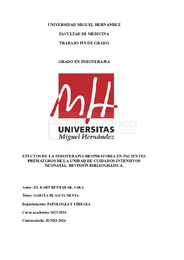Título :
Efectos de la fisioterapia respiratoria en pacientes prematuros de la unidad de cuidados intensivos neonatal. Revisión bibliográfica |
Autor :
El Kart Bentahar, Sara |
Tutor:
García Blasco, Silvia |
Editor :
Universidad Miguel Hernández |
Departamento:
Departamentos de la UMH::Patología y Cirugía |
Fecha de publicación:
2024-05-31 |
URI :
https://hdl.handle.net/11000/33545 |
Resumen :
Introducción. Los pacientes prematuros en la Unidad de Cuidados Intensivos Neonatal enfrentan
diversos problemas en sus primeras horas de vida debido a la inmadurez de sus pulmones. Entre las
patologías más comunes se encuentran el Síndrome de Distrés Respiratorio, las atelectasias,
obstrucción de las vías respiratorias, la neumonía, la dificultad para eliminar secreciones y el
compromiso en el intercambio gaseoso. La fisioterapia respiratoria utiliza distintas técnicas para
mejorar estos síntomas y prevenir otros posibles riesgos.
Objetivos. Realizar una revisión bibliográfica que proporcione una perspectiva sobre los tratamientos
más recientes y efectivos de fisioterapia respiratoria para asistir en el manejo adecuado de los
pacientes prematuros en la unidad de cuidados intensivos neonatal.
Material y métodos. Búsqueda bibliográfica en las bases de datos Pubmed, Pedro, Scielo, Scopus y
Cochrane de artículos publicados en los últimos 10 años.
Resultados. La técnica de Espiración Lenta Prolongada mejora la expansión torácica y reduce el
riesgo de colapso pulmonar. Para pacientes prematuros con SDR la técnica de insuflación pulmonar
selectiva no altera el flujo sanguíneo cerebral y la técnica de reclutamiento pulmonar mejora los
parámetros respiratorios. La técnica de Vojta reduce los días de hospitalización y el uso de ventilación
mecánica. Todas las técnicas de fisioterapia respiratoria son seguras y beneficiosas.
Conclusión. Aunque se ha demostrado la eficacia de la fisioterapia respiratoria en pacientes
prematuros, es necesario realizar más estudios sobre este recurso terapéutico para obtener una mayor
evidencia científica que respalde esta información y promueva avances significativos.
Introduction. Premature infants in the neonatal intensive care unit face various problems in their first
hours of life due to the immaturity of their lungs. Among the most common conditions are respiratory
distress syndrome, atelectasis, airway obstruction, pneumonia, difficulty in clearing secretions, and
impaired gas exchange. Respiratory physiotherapy employs various techniques to improve these
symptoms and prevent other potential risks.
Objectives. To conduct a literature review that provides an overview of the most recent and effective
respiratory physiotherapy treatments to assist in the proper management of premature infants in the
neonatal intensive care unit.
Materials and Methods. A bibliographic search was conducted in the databases Pubmed, Pedro,
Scielo, Scopus, and Cochrane for articles published in the last 10 years.
Results. The technique of slow prolonged expiration improves chest expansion and reduces the risk of
lung collapse. For premature patients with RDS, the selective lung insufflation technique does not
alter cerebral blood flow, and the lung recruitment technique improves respiratory parameters. The
Vojta technique reduces hospital stay and the use of mechanical ventilation. All respiratory
physiotherapy techniques are safe and beneficial.
Conclusion. Although the efficacy of respiratory physiotherapy in premature patients has been
demonstrated, more studies on this therapeutic resource are needed to obtain greater scientific
evidence to support this information and promote significant advances.
|
Palabras clave/Materias:
Recién nacido
prematuro
fisioterapia
fisioterapia respiratoria |
Área de conocimiento :
CDU: Ciencias aplicadas |
Tipo de documento :
info:eu-repo/semantics/bachelorThesis |
Derechos de acceso:
info:eu-repo/semantics/openAccess |
Aparece en las colecciones:
TFG - Fisioterapia
|
 La licencia se describe como: Atribución-NonComercial-NoDerivada 4.0 Internacional.
La licencia se describe como: Atribución-NonComercial-NoDerivada 4.0 Internacional.
.png)
